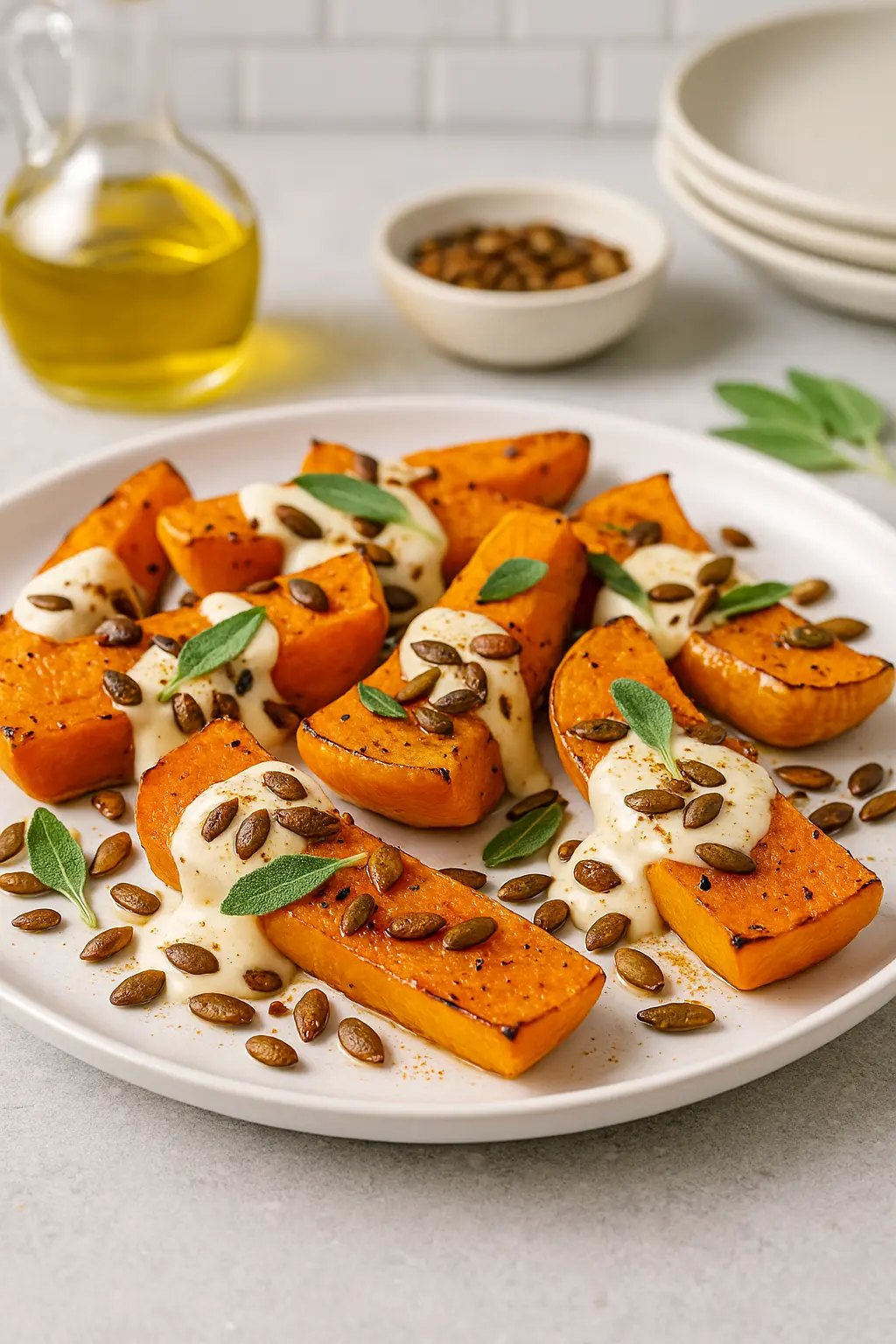Roasted Delicata Squash: A Simple, Flavorful Seasonal Delight
When I think back to the earliest days of autumn or even the breezy end of summer, one ingredient always brings warmth and comfort to my kitchen: delicata squash roasted simply with herbs and olive oil. My grandmother used to call it the “lazy cook’s secret weapon” because it’s wonderfully low-maintenance and yet so elegant in flavor.
In this article, I’ll walk you through an easy, deeply flavorful delicata squash roasted recipe that brings out the best of this tender-skinned squash. Perfect for chilly winter evenings or as a sunny side dish at a summer barbecue, it’s as versatile as it is delicious.
Whether you’re new to this ingredient or already a fan, this guide will give you everything you need. From choosing the right squash to pairing it with complementary flavors, you’ll find delicata squash roasted to be one of the most rewarding recipes in your kitchen.
Why Roasted Delicata Squash Is a Seasonal Favorite
What Makes Delicata Squash Special?
Unlike butternut or acorn squash, delicata squash has a tender, edible skin. When delicata squash roasted in the oven, its natural sweetness deepens, creating a golden caramelization that’s irresistible. The flavor is a blend of sweet corn and nutty potato, making it a crowd-pleaser every time.
Summer or Winter? It Works for Both
Delicata squash roasted is ideal in any season. Though it’s technically a winter squash, it’s harvested in late summer and early fall, offering flexibility for summer salads and winter comfort meals.
- In summer, serve delicata squash roasted with fresh herbs and grilled proteins.
- In winter, combine it with earthy spices and serve alongside hearty grains or roast meats.
How to Select and Prepare Delicata Squash
At the store or market, look for squash that is:
- Firm with cream-colored ridges and deep green stripes
- Free from soft spots or discoloration
- Medium in size, around 6 to 8 inches, for best flavor
Prep Tips
To get the best results with delicata squash roasted, follow these simple steps:
- Wash the squash thoroughly since the skin is edible.
- Cut off both ends to stabilize it.
- Slice lengthwise and scoop out the seeds.
- Cut into ½-inch half-moon slices.
Recipe: Delicata Squash Roasted with Garlic and Thyme
This recipe serves six and is incredibly easy. It’s perfect as a side dish or tossed into grain bowls. If you’re looking for something quick, seasonal, and crowd-pleasing, delicata squash roasted is your answer.
Prep Time: 10 minutes
Cook Time: 30 minutes
Servings: 6
Ingredients
- 3 medium delicata squash
- 2 tablespoons olive oil
- 1 tablespoon maple syrup (optional)
- 1 teaspoon sea salt
- ½ teaspoon black pepper
- 1 teaspoon garlic powder or 2 cloves garlic, minced
- 1 tablespoon fresh thyme or 1 teaspoon dried
- Optional: red pepper flakes or grated parmesan

Instructions
- Preheat your oven to 425°F. Line a baking sheet with parchment paper.
- Prepare the squash as described earlier and place slices in a large bowl.
- Add olive oil, garlic, thyme, salt, pepper, and maple syrup if using. Toss well to coat.
- Spread the slices in a single layer on the baking sheet.
- Roast for 25 to 30 minutes, flipping halfway through, until the delicata squash roasted slices are golden brown and tender.
- Garnish with chili flakes or parmesan if desired.

Customizing Delicata Squash Roasted to Suit Your Taste
The beauty of delicata squash roasted lies in its versatility. Here are a few ways to adapt it:
For a Sweeter Profile:
- Add brown sugar and cinnamon before roasting.
- Finish with a balsamic glaze and toasted walnuts.
For a Savory Kick:
- Season with smoked paprika and cumin.
- Top with tahini sauce and sesame seeds.
Turn It Into a Full Meal:
- Combine delicata squash roasted with quinoa, arugula, and goat cheese.
- Use it in a warm grain bowl with lentils and a herb vinaigrette.
Nutrition Benefits of Delicata Squash Roasted
Not only is delicata squash roasted delicious, it’s also packed with nutrients. One cup contains:
- 80 to 100 calories
- High fiber content for digestive health
- Beta-carotene for vision and immune support
- Potassium and magnesium for muscle and nerve function
Tips for the Best Delicata Squash Roasted
- Do not crowd the pan. This allows each slice to caramelize properly.
- Roast at high heat. 425°F ensures crispy edges.
- Flip halfway. This gives both sides a golden finish.
Pairing Ideas for Delicata Squash Roasted
This dish is incredibly food-friendly. Try it with:
- Roasted chicken or grilled salmon
- Wild rice or farro
- A kale and apple salad with vinaigrette
Why Delicata Squash Roasted Deserves a Spot on Your Table
Delicata squash roasted is not just another vegetable side dish. It’s flavorful, nutrient-dense, easy to prepare, and looks beautiful on the plate. Whether you serve it at a summer cookout or a winter feast, it never fails to impress.
Once you try delicata squash roasted, you’ll understand why it’s a staple in so many kitchens. The natural sweetness, the crispy edges, and the way it pairs with countless seasonings make it a must-have for any season.
How to Store and Reheat Delicata Squash Roasted
If you have leftovers, don’t worry. Delicata squash roasted is incredibly storage-friendly.
Storage:
- Allow the squash to cool completely before storing.
- Place in an airtight container and refrigerate for up to 4 days.
- For longer storage, you can freeze it. Use a freezer-safe bag and store for up to 2 months.
Reheating:
- For best texture, reheat in the oven at 375°F for 10 minutes.
- You can also reheat in an air fryer or skillet to restore crisp edges.
- Microwaving works too, although the squash will be softer.
Creative Ways to Use Leftover Delicata Squash Roasted
Leftovers from delicata squash roasted can be used in many ways to avoid waste and save time in the kitchen.
- Toss into a frittata or omelet for a hearty breakfast.
- Blend into a creamy soup with broth and roasted garlic.
- Mash and mix into risotto or polenta for added sweetness and color.
- Layer into a veggie sandwich or wrap with hummus and greens.
Read more : https://chefnip.com/peppermint-caramel-hot-cocoa-bar/
Flavor Pairings That Elevate Delicata Squash Roasted
This squash pairs beautifully with both sweet and savory elements. Consider adding:
- Herbs: Sage, rosemary, parsley, or chives
- Spices: Nutmeg, cayenne, or curry powder
- Acid: Balsamic vinegar, lemon juice, or apple cider vinegar
- Fats: Brown butter, coconut oil, or ghee
These ingredients bring out different notes in the delicata squash roasted, giving you endless ways to enjoy it.
Sustainability and Seasonal Eating
Eating seasonal produce like delicata squash is a great way to reduce your carbon footprint. It is usually available in late summer through early winter, depending on your region. Supporting local farmers by purchasing fresh squash from farmers markets or CSAs ensures better taste and less environmental impact.
Delicata squash roasted is a smart addition to your sustainable kitchen routine. It uses the whole vegetable, including the skin, which means less food waste.

Kid-Friendly Option: Delicata Squash Roasted “Fries”
Looking for a healthier alternative to traditional fries? Slice delicata squash into thin strips, toss with olive oil, and roast until crispy. Serve with ketchup, garlic aioli, or ranch for a snack that both kids and adults will enjoy.
Serving Suggestions for Holidays and Special Occasions
Delicata squash roasted can shine on any holiday table.
- For Thanksgiving, pair it with roasted turkey and cranberry sauce.
- For Christmas, serve with a maple glaze and toasted pecans.
- For a vegetarian main, combine it with roasted mushrooms and wild rice.
It is colorful, naturally sweet, and looks beautiful when served on a large platter.
What Makes Delicata Squash Roasted Unique Among Winter Squash?
Most winter squashes like acorn or butternut need to be peeled, but not this one. The skin becomes soft and flavorful after roasting. This means less prep and more flavor. It also cooks faster than many other varieties, making it ideal for busy weeknights.
Compared to other squashes, delicata squash roasted has a lower moisture content. This allows for a crispier edge and more concentrated flavor.
Fun Fact: A Brief History of Delicata Squash
Delicata squash dates back to the late 1800s and is part of the Cucurbita pepo family, the same group as zucchini and pumpkins. It is also sometimes called “sweet potato squash” because of its similar taste. This heirloom variety gained popularity for its ease of preparation and exceptional flavor.
Although it was nearly forgotten in the mid-20th century due to its perishability, its resurgence is thanks to farmers who valued its taste and introduced improved varieties with longer shelf life.
Why You Should Add Delicata Squash Roasted to Your Weekly Rotation
Once you’ve tried it, you will likely make delicata squash roasted a regular feature on your table. It is budget-friendly, packed with nutrients, and incredibly versatile. Whether you are vegan, vegetarian, gluten-free, or simply looking to eat healthier, this dish checks all the boxes.
Cooking delicata squash roasted also requires minimal kitchen equipment. A baking sheet, sharp knife, and oven are all you need. It is a beginner-friendly recipe that offers professional-level flavor.
Health Benefits of Regularly Eating Delicata Squash Roasted
Delicata squash roasted is more than just tasty. It supports your health in several ways:
- Rich in antioxidants like beta-carotene, which promotes healthy skin and eyes.
- High fiber content aids in digestion and supports a healthy gut.
- Low in fat and calories, making it ideal for weight-conscious diets.
- Contains vitamin C and manganese, which are essential for immune function.
Eating delicata squash roasted regularly is a delicious way to support your wellness goals.
FAQ
Does goat cheese go with honey?
Yes, goat cheese pairs beautifully with honey. The tangy creaminess of goat cheese balances the natural sweetness of honey, making it a classic combination for appetizers, toasts, and cheese boards.
Are you supposed to eat the skin of delicata squash?
Yes, the skin of delicata squash is tender and edible once roasted or cooked. There is no need to peel it.
What to make with crumbled goat cheese?
Crumbled goat cheese can be used in salads, flatbreads, omelets, pasta, grain bowls, stuffed peppers, or spread over roasted vegetables. It adds creaminess and tang to both savory and sweet dishes.
Do squash and cheese go together?
Yes, squash and cheese pair very well. The sweetness of squash complements the richness of cheeses like goat cheese, parmesan, cheddar, and feta.
What flavors pair well with squash?
Flavors that pair well with squash include garlic, sage, thyme, rosemary, cinnamon, nutmeg, honey, maple, pecans, walnuts, and cheeses like goat cheese or parmesan.
What to not mix with cheese?
Cheese does not pair well with very acidic fruits like grapefruit, overly bitter greens, or foods with intense metallic flavors such as some canned fish. These can overpower the cheese.
What flavors pair well with goat cheese?
Goat cheese pairs well with honey, figs, roasted beets, pears, apples, walnuts, pecans, fresh herbs like thyme and basil, and vegetables such as squash, spinach, or mushrooms.
What cheeses pair best with honey?
Soft cheeses like goat cheese, brie, ricotta, and mascarpone pair wonderfully with honey. Aged cheeses such as manchego and parmesan also work well when drizzled with honey.
Is goat cheese healthy?
Yes, goat cheese can be a healthy option. It is often easier to digest than cow’s milk cheese, lower in lactose, and contains beneficial fats, protein, calcium, and probiotics. Moderation is still important.
What seasoning is good on delicata squash?
Seasonings that work well include salt, pepper, garlic powder, paprika, cinnamon, nutmeg, rosemary, thyme, and sage. A drizzle of olive oil or maple syrup enhances the flavor.
What temperature to roast delicata squash?
Roast delicata squash at 400°F (200°C) for about 20 to 25 minutes until golden and tender.
Is delicata squash anti-inflammatory?
Yes, delicata squash contains antioxidants, fiber, and vitamins such as vitamin C and vitamin A, which support the body’s natural anti-inflammatory processes.





